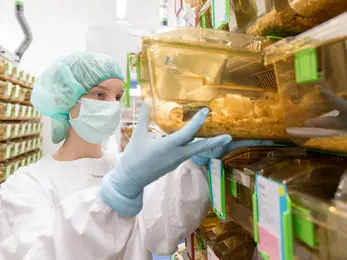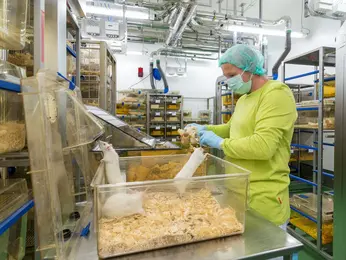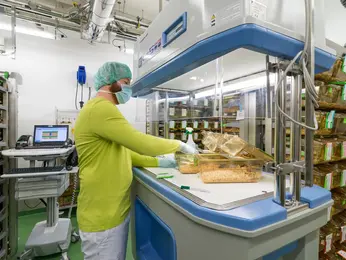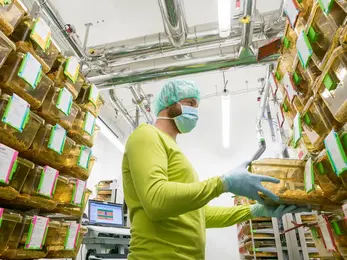Center for Preclinical Research (CPR)
Dr. Annalena Riedasch

Since 2023 DKFZ is a member of Initiative “Transparente Tierversuche” (initiative for transparent animal experimentation).

In addition to the physical and psychological burden for patients and their families, cancer is also a major health policy problem. The DKFZ is involved in research into the molecular mechanisms of cancer development and progression as well as the development and improvement of therapeutic interventions.
Wherever possible, DKFZ researchers use cell cultures, organoids or computer simulations (replacement) in their research projects. Due to the complexity of the disease cancer, which affects the entire organism, the informative value of such alternative in vitro/in silico systems is unfortunately limited in many cases. In order to understand the complexity of a systemic disease such as cancer, it is therefore essential to carry out animal experiments. Here, animal experiments are limited to what is absolutely necessary (reduction) and gentle techniques are used to treat laboratory animals with consideration (refinement and culture of care). DKFZ researchers prefer to use rodents for their animal experiments, in rare cases also amphibians and fish.
In order to reflect the development of a specific cancer in humans, including the various symptoms, a wide variety of tumor models are used in today's cancer research. In particular, genetically modified mice with tissue-specific gain or loss of genes are used to elucidate their role in tumor development. In addition, mice with impaired immune systems are often used to enable the transfer of human tumor cells. Finally, certain tumors are produced in experimental mice with the help of cancer-causing substances.
In Germany, animal experiments are regulated and strictly monitored by several legal norms. Among the most important are the German Animal Welfare Act (TierSchG) and the Animal Welfare Experimental Animals Ordinance (TierSchVersV). Animal welfare is also formulated as a national objective in the German Basic Law (Art. 20a). The team of the Central Animal Laboratory (ZTL) at the DKFZ, consisting of animal care staff, veterinarians and administrative staff, ensure that all animals are kept at the highest level of hygiene in accordance with the applicable national and international legislation and ensure the welfare of the animals.
This is the basic prerequisite for researchers to be able to work on questions relating to complex cancer processes. In addition to safeguarding animal welfare, the animal welfare officers support and advise the researchers in planning and conducting their experiments. The ZTL diagnostics laboratory regularly checks the health of the animals. The transgene unit supports scientists in the generation of customized genetically modified mouse models for specific human tumour diseases. It also genetically validates the most important mouse strains by obtaining sperm or early embryos from carrier animals and storing them in liquid nitrogen.
The Tumor Models Unit carries out cancer studies in animals for DKFZ researchers by applying carcinogenic substances and by transferring cancer cells into immunodeficient mice and conducts both diet and therapy studies.
Central Animal Laboratory
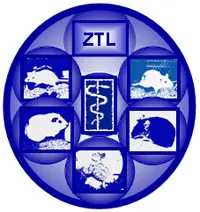
Members of the Central Animal Laboratory breed and house animals for all Research Groups of the DKFZ. In addition to rats (Rattus norvegicus), guinea pigs (Cavia porcellus), mastomys (Mastomys coucha), and amphibians (Xenopus species), genetically manipulated mice (Mus musculus), in particular play a crucial role in cancer research.
A team of Clinical Veterinarians specialized in laboratory animal science is heading the facility. Qualified Animal Technicians working in a team take care of specific animal colonies. Advanced education courses and enhanced in-house training are the basis for optimal qualified Animal Technicians. An intensive and constructive cooperation between Veterinarians, Animal Technicians and Scientists ensure not only the legal requirements with regard to housing, space, temperature, humidity and enrichment etc. but also ensures minimal stress for animals in experimental conditions. For documentation of breeding, a specialized software program is installed to ensure adequate transparency for all concerned.
Not only do the animal welfare regulations require that animals should be free from disease, it is also an important prerequisite for gaining meaningful experimental results. The Specific Pathogen-Free status (SPF) is achieved by housing the animals in special barriers or in individually ventilated cages (IVC). Through close cooperation with Personnel from the Unit Microbiological Diagnostics, the animals are closely monitored. With these control standards, animals with an optimal microbiological quality are provided for research. With regard to importation of animals, there will always be a need for cleaning up mouse strains that are contaminated with undesirable pathogenic microorganisms. This cleaning up process is performed through an embryo transfer system; mouse embryos that are only a few days old are removed from the contaminated donor mother and then transplanted into an SPF hygiene status recipient mother. The mother and her offspring are then maintained in a positive pressure isolator. Following intensive microbiological examination to establish the health status, the offspring can then be transferred to the SPF area of choice.
To mimic genetic changes in human tumors, in cancer research mouse models have been established in inbred strains of a high standardized background; these mouse models carry appropriately mutated genes or gene combinations known as transgene/transgenic or knockout allele(s). In order to check the authenticity of inbred strains, a program for systematic analysis of a panel of single nucleotide polymorphisms (SNPs) has been introduced.
The German Cancer Research Center has set up a modern animal house and works closely with the animal welfare authorities. Our scientists rely on the 3R rule: we carry out as few animal experiments as possible (reduction), we try to improve them through continuous further development (refinement) and, if it seems possible, to replace them with alternatives (replacement). However, a disease as complex as cancer, which affects the whole body, can never be fully visualized on a screen or in a culture dish. In this respect, we support the establishment of the joint initiative of the Alliance of Sciences “Understanding animal experiments”, which aims to provide information about animal experiments in research. Here you can find the pages of Tierversuche-Verstehen.
Tumor Models
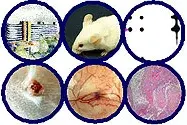
Malignant tumors are complex tissues which arise from normal cells in a protracted multi-step process. Driving forces of tumor development are the progressive accumulation of genetic and epigenetic DNA alterations. As a consequence, such changes disturb cellular signaling pathways and regulatory circuits in affected cells conferring growth advantages, landscaping the micro-environment of the tumor cells, and supporting escape from immunosurveillance. Concomitantly, new blood vessels are formed, inflammatory cells are recruited, and fibroblasts are activated in the surrounding tumor stroma. The complex interactions between tumor cells and vessel, immune, or stroma cells are not yet traceable in an authentic manner in cell cultures in vitro. Therefore, in vivo mouse models of cancer including genetically engineered mouse lines and hetero-grafted mice are indispensable tools for the exploration of the molecular and cellular fundamentals of tumor growth as well as translational applications in cancer research.
The Core Facility Tumor Models offers expertise, specific technical equipment, and resources to efficiently and successfully organize the design, realization, and data interpretation of animal experiments in approved in vivo cancer-related models, thereby using state-of-the-art-protocols that comply with legal requirements.
Our current offer of service comprises:
MITO database for models in Translational Oncology
The tasks will be met either in a full or in an assisted service. This implies a training of participating experimenter, particularly in the application of carcinogens and irritating agents. The range of tumor models will be adjusted to changing scientific needs.
Microbiological Diagnostics
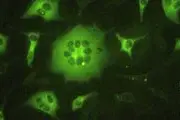
Meaningful scientific results can only be achieved with a minimum number of laboratory animals if the animals are free from pathogens that could falsify the test results. Microbiologically standardized animals are a prerequisite for limiting animal experiments to the legally prescribed “essential minimum”. The task of the Microbiological Diagnostics department is to prevent harmful microorganisms from being introduced into the animal husbandry of the Cancer Research Center and to ensure that the animals kept in the central animal laboratory are free of infections and parasites. Biological materials used in experiments, such as cells, tumor samples or sera, are also examined for contamination with bacteria, fungi and viruses before they are used for experiments.
Transgen Service
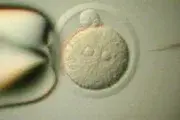
The Transgen Service supports scientists at the DKFZ in the generation of genetically modified (transgenic) mouse lines. This procedure involves inserting, changing or deleting DNA sequences in the animals' genetic material. Depending on the scientific question, an inserted gene can be translated into a biologically active protein, or a specific gene of the recipient animal can be modified or silenced.
Further informations can be found on the pages of Transgen Service:
Section 10 of the Animal Welfare Act stipulates that organizations responsible for facilities in which animal experiments are carried out on vertebrates must appoint one or more animal welfare officers (TSOs). The duties of the animal welfare officers are defined in the Animal Welfare Experimental Animals Ordinance (§5).
The animal welfare officers are the first point of contact for DKFZ employees in all matters relating to animal welfare and laboratory animal science. They are the intermediary between the scientists working in animal experiments and the authorities. Through their advice and statements, they are to ensure in a collegial manner that the employees of the institution are encouraged to act in an animal-friendly manner and that a culture of care is created at the center.
The DKFZ Animal Welfare Committee combines animal welfare, animal care and animal use to continuously improve the welfare of laboratory animals at the DKFZ and thereby implement a responsible culture of care.
The committee is composed of animal care staff, veterinary and scientific staff and the DKFZ compliance officer. The necessity of the Animal Welfare Committee and its tasks are based on §6 of the Animal Welfare Experimental Animal Ordinance and can be found in the statutes, which were signed by the Executive Board. These include supporting the animal welfare officers, monitoring the development of animal experiments and their results, and advising all persons at the DKFZ who work with laboratory animals with regard to limiting pain, suffering and harm to an absolute minimum, improving the keeping, breeding and care of laboratory animals, checking whether alternatives to animal experiments are available and limiting the number of laboratory animals to an absolute minimum.
Information and Training
- LAS interactive
- Humane Endpoints in animal studies
- Procedures With Care
- GV-Solas: helpful informations
Animal testing and alternatives to animal testing (3R: replace - reduce - refine)
- The German Center for the Protection of Laboratory Animals Bf3R
- Understanding animal testing - A science information initiative
- Recommendations of the National Committee (TierSchG)
- NC3Rs National Centre for Replacement, Refinement & Reduction in UK
- ALTEX - Alternatives to Animal Experimentation
- European Commission and 3R
Prices and funding opportunities in the 3R area
(Inter)national laboratory animal societies
- GV-Solas: Society for Laboratory Animal Science
- FELASA: Federation of European Laboratory Animal Science Associations
- ICLAS: International Council for Laboratory Animal Science
- AALAS: The American Association for Laboratory Animal Science
- LASA: The Laboratory Animal Science Association, UK
Other important organizations
Events and public relations work
On February 19, 2022, Heidelberg residents were able to find out more about animal testing at the “Science in the City” event in the Old Town. In a pop-up store, ZPF employees were on hand for a day with pictures, materials, cages and posters to answer questions from interested members of the public on the difficult topic of animal testing. Theresia Bauer, Minister of Science, Research and the Arts at the time, and Susanne Aschhoff, Member of the State Parliament, visited the pop-up store together with Michael Baumann and learned about animal husbandry at the DKFZ and the necessity of animal experiments in cancer research.
International Laboratory Animal Day on April 24, 2022: Press event at the DKFZ and joint tour of the animal facility
The DKFZ took the International Day of Laboratory Animals on April 24 as an opportunity to provide information about animal experiments at a press event.
Prof. Matthias Heikenwälder and PD Angelika Riemer used selected research projects to illustrate how indispensable animal experiments currently are in cancer research. Dr. Annalena Riedasch, veterinarian at the Center for Preclinical Research and head of the Animal Welfare Committee at the DKFZ, explained how animals are kept at the DKFZ in accordance with the highest animal welfare standards worldwide and how animal experiments are carried out. A visit to the central animal laboratory was also on the agenda at the press event.
The Frankfurter Allgemeine Zeitung, the regional newspapers RNZ and Mannheimer Morgen as well as SWR, among others, reported on the topic.
Video in the SWR media library: “Cancer research: DKFZ in Heidelberg explains animal experiments”
Get in touch with us

